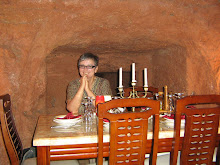
The conference, "Communicating Poverty", was held in the plush surroundings of the Excelsior Hotel in Floriana, looking out on the maxi yachts moored at Manoel Island. The project, Media Engagement in Development Issues and Promotion (MEDIP), was a collaborative project between Malta, Hungary, Cyprus, Estonia, Slovenia and Romania, all recent members of EU. It was about media coverage of issues of poverty. As one delegate put it, "How do you make poverty sexy?"
I went along on Saturday because I had been to a previous conference last year in St George's bay where I heard for the first time of the EU millennium goals addressing issues of poverty. I was interested in what appeared to be one project's outcome in the lead-up to the target year of 2015. The objective of the MEDIP project is to enhance the contribution of the participating six new EU member states towards the achievement of the Millennium Development Goals. The strategy is to sensitise journalists and the media to these goals. I haven't yet seen today's papers but I found nothing about the conference in Sunday's papers although I had previously found out that it was happening from an advertisement in the print media. I discovered that part of the project included a training workshop for mainstream media held in Malta in March last year. With hindsight, I think I may have noticed a change in the language used by the media to report on issues of poverty. For example, most articles use the term "irregular" rather than "illegal" to report on the people who are currently in Malta without standard documentation.
The conference was organised in two similar sessions each starting with a lecture presentation. This was followed by the screening of one of the 30 minute documentaries made by contributing countries after a trip to Uganda, and the session finished up with a panel discussion. Each of the six participating states has made a video focussing on different millennium goals. Malta's contribution looked at maternal health in Uganda and the other video screened was made by Hungary and examined issues of gender equality. Discussion centred on positive versus negative coverage. Poverty is grey, grinding and long-term rather than dramatic, sudden and emotional. It is difficult to portray the factual information in a way that creates hope and dignity for the people involved as well as maintaining interest by a Western audience already distanced by geography and experience.
One of the ways forward is for the media to help bridge this distance between audience and the people involved. The MEDIP project sought to achieve this geographically by taking the media to the issue in Uganda to make the videos. Another bridge is to enable a Western audience in examining their own experience to reveal how it impacts on global poverty. A good example cited at the conference was the British TV series where young fashion-conscious people were transported to one of the sites in India where their garments were made. They were required to live the life of a worker in that situation and the subsequent excellent documentary was about that experience.
Poverty as a global issue was discussed at the conference but in terms of avoiding the trap of competitive poverty where people seek to claim greater poverty than their neighbour. There wasn't time, although it was hinted at, to discuss how Western behaviour contributes to global poverty.
Another way to bridge the experience gap is to tap in to the stories of people who have come to Malta from other lands seeking to escape poverty. Academic, Teresa Hanley, emphasised this bridging point in her talk but again there wasn't time to discuss further. It was also touched upon in the introductory lecture by Mr Bouratsis, a director of EuropeAid, when he pointed out that EU sends a lot of aid outside of Europe because their policy is not to close off to the rest of the world. The EU is not a fortress protected in times of internal hardship from seeing how that hardship is linked to the wider world.
The photo that heads up this post was taken yesterday when I went on the Malta Council for Culture and the Arts tour of Birkirkara. It is one of the carriages from the train that ran briefly from Mdina to Valletta at the turn of C20 until 1930s. It went bankrupt reportedly because they collected the fares at the end of the trip when the train arrived in Valletta so people used to get off at the stop before and walk in! Ironically, the conference finished with a sumptuous buffet lunch with multiple courses and wine. I felt guilty about enjoying such a free lunch at a conference on poverty so this article is my contribution!

1 comment:
Hi Jo, A good post, although I must admit some cynicism when I see attempts being made to change the language of poverty. Softening, even temporarily, the impact of certain words does not necessarily serve a good purpose, especially for those so named. However any attempt to raise awareness of poverty whether in one's own homeland or in a foreign country is laudable.
Post a Comment